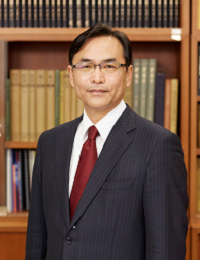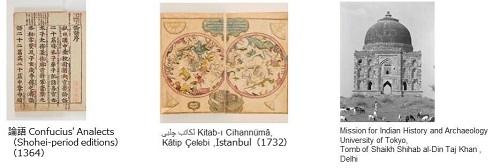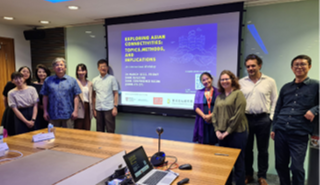-Creating a world-class research environment to open up Asian wisdom to the world-
Message from the Director
Today, Asia accounts for more than 60% of the world's population and consumes the majority of the world's resources. In the face of growing crises that combine to threaten the survival of humankind, there is a social need to systematize and universalize wisdom to deal with uncertainties in Asia, not only on the basis of Western-centric concepts, but also on the basis of Asian experiences, and to open up the resulting knowledge to the world. The Institute for Advanced Studies on Asia(IASA) will further strengthen its function as an international hub for intellectual exchange by fostering a world-class environment for Asian studies, to open up Asian wisdom to the world. With this challenging aim in mind, we have established a special fund, the IASA Foundation, to promote frontier Asian studies that will contribute to the achievement of the SDGs and foster Asian studies scholars with an international perspective, thereby promoting new intellectual developments in Asian studies. In the spirit of this mission, we ask for your generous support.
Join us in our mission to transform the global understanding of Asia by supporting the University of Tokyo's Institute for Advanced Studies on Asia. As Asia stands at the forefront of global challenges and opportunities, our institute is dedicated to creating a world-class research environment that opens up Asian wisdom to the world.
Why Your Support Matters
- Preserve and Innovate: Help us digitize and preserve over 700,000 volumes of invaluable Asian research materials, making them accessible to scholars worldwide.
- Foster Global Dialogue: Your contributions will support programs like Global Asian Studies (GAS), which bridge cultural and academic gaps through international fellowships and workshops.
- Advance Cutting-edge Research: Enable international collaboration and dissemination of groundbreaking research through open-access publishing projects.
Impact of Your Donation
Your generosity will aid in maintaining our IASA Library, welcoming international researchers, and continuing our legacy as a hub for intellectual exchange and innovation. Together, let's nurture a new generation of scholars and foster a deeper, more nuanced understanding of Asia's role in the world. Your support is crucial in achieving this vision.

Director of IASA

About the Institute
The University of Tokyo Institute for Advanced Studies on Asia was founded November 26, 1941 as a “comprehensive research center for the study of Asia, broadly defined,” and has pursued this objective for over 80 years.
The Institute’s remit stretches across the Eurasian continent – from the Arabic-speaking world, including North Africa, in the west, to Japan in the east; and from the Altaic-speaking world, including the Russian Federation, in the north, to Indonesia in the south. In recent years our researchers have widened their scope to investigate global relationships with Asia that reach beyond the Eurasian continent. Academic fields of study include politics, society, law, economics, religion, thought, culture, anthropology, history, archaeology, literature, and art.
Maintaining a wide variety of Asian research materials
The IASA Library boasts a collection of 700,000 volumes on the Asian region. In particular, the 240,000 volumes of East Asian-related materials, mainly Chinese classics, form a world-class resource. The library also holds many rare books and collections impossible to find elsewhere, domestically or abroad. Examples include a hand-transcribed 13th century Arabic commentary on “A Guide to Philosophy”; and Shohei-period editions of Confucius' Analects, dating from the mid-14th century and the first non-Buddhist book printed in woodblock in Japan. Storing these precious materials requires carefully controlled temperatures, humidity and air circulation. However, maintaining such air conditioning systems is a significant expense. In addition, the library also preserves a large collection of photographs from prewar and postwar field surveys. Many of the buildings and structures captured in these survey photographs do not exist today, giving them internationally recognized value. In order to make these classic and modern resources accessible to as many people as possible, both in Japan and abroad, the Institute is working to transform its catalog and other documentation into a high-resolution digital archive.

Global Asian Studies(GAS)
At a time when the world is increasingly divided, area studies experts in Asia, having witnessed such divisions as part of their own intellectual history, are now expected to present new ideas rooted in the “Asian experience” that also transcend conventional regional and disciplinary boundaries.
In FY2022, our Institute launched a new program called Global Asian Studies (GAS) to promote both Asianization and universalization of Asian studies by utilizing the research and educational networks of Asian Studies that we have cultivated over the years. Through this program, we aim to foster mutual understanding and a new type of research in Asia by creating a platform for dialogue among researchers around the world. We also plan to publish numerous booklets to inspire university students and young researchers.
One notable initiative is the JF-GJS Fellowship Program, jointly managed with the Japan Foundation, which has begun accepting several postdoctoral fellows annually. The goal is to promote dialogue between Japan studies experts in Asia and Asian studies experts in Japan. Through various activities in the GAS program, we will continue to foster intellectual exchanges among Asian studies scholars worldwide.

Publishing Projects
The Institute has two major publishing projects.
The first is the International Journal of Asian Studies, edited at the Institute for Advanced Studies on Asia and published by Cambridge University Press. Founded in 2004, the journal serves as an English-speaking platform for disseminating scholarship related to Asia across all disciplines. It also serves as a conduit for introducing the achievements of excellent researchers in Asia to English-speaking researchers across the world.
The second is The University of Tokyo Studies on Asia book series, published by Springer, which translates excellent Asian studies results into English and publishes them through Springer. The first two volumes, “The Semantics of Development in Asia : Exploring 'Untranslatable' Ideas Through Japan” (authors Jin Sato and Soyeun Kim) and “Asia Rising : A Handbook of History and International Relations in East, South and Southeast Asia” (authors Ryo Sahashi, Yasuhiro Matsuda, and Waka Aoyama), have been published.
Both publishing projects are open access, providing equal access to cutting-edge knowledge and learning experiences to researchers and students around the world.
Welcoming researchers from around the world
The Institute accepts overseas graduate students and young researchers as visiting researchers on short- or long-term bases, mainly for the purpose of using library materials and conducting research collaborative research with faculty. In the five years before the COVID-19 pandemic, from 2015 to 2019, we accepted 459 researchers from 43 countries. From 2023, visitors again reached pre-pandemic levels. To further enhance achieve the research environment for visiting researchers, we will develop systems to prepare library materials in advance and improve induction procedures.




